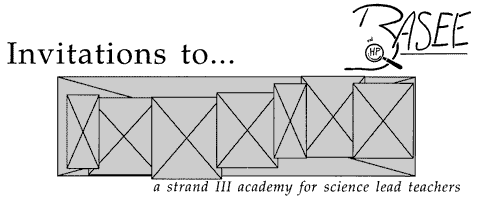
 |
|||
Summer Workshop PlansSummer Workshop Agenda
Bay Area Schools for Excellence in Education (BASEE) |
|||||||||||||||||||||||||||||||||||||||||||||||||||||||||||||||||||||||||||||||||||||||||||||||||||||||||||||||||||||||||
| Strand I. | This program for new teachers or those new to their science kits, features kit trainings throughout the year. |
| Strand II. | Experienced teachers gain science content background through models of good teaching strategies. |
| Strand III. | Lead teachers (one from each school site) strengthen leadership skills through coaching training, science content learning and an inquiry institute. |
This past summer our project offered two different institutes. In June, Celebrating Physical Sciences, was a one-week program for Strand II teachers. Participants selected the one physical science topic they teach from six choices:
On the last day of the institute, each content area teacher group shared a snapshot of what they'd learned through a short presentation. Many were charming skits, playful song rewrites (especially the Sound session) and artful storytelling.
As follow up to these sessions, teachers will have the opportunity to select from two experiences. The first, Cases, is an in-depth discussion group around classroom teaching dilemmas that surface the content background. We are working with WestEd to pilot these as ways to help teachers enhance their content background in the context of genuine teaching problems. The second, questioning strategies with Larry Lowery, is an opportunity to work with a small group of colleagues to refine questioning skills by video taping oneself during practice sessions, and processing the learning with the group.
Invitations to Inquiry is an institute we designed for our strand III teachers. Our program, based on the model from the Exploratorium, provided 30 hours of training in elements of inquiry. We deliberately included the BASEE learning model in each of our lessons as well as the design for the weeklong learning. In doing so, we featured content learning throughout the week. To complement our yearly focus on physical sciences we used topics not taught during the June Celebrating Physical Sciences week since a number of our teachers attended both programs. The inquiry week focused instead on light and color.
The agenda for the week follows:

| Day 1 | Monday, August 10 | Engage |
| Storyline: Is all hands-on inquiry? How do we ask stretching, productive questions? | ||
| Morning | Welcome and Introductions Three Kinds of Hands-On Science: Tops |
|
| Lunch | 12:00 - 12:45 | |
| Afternoon | Taking the Plunge Reflections and Assessment |
|
| Day 2 | Tuesday, August 11 | Explore |
| Storyline: How do we distinguish investigable questions? What tools do we use in science? | ||
| Morning | Raising Questions: Ice Balloons | |
| Lunch | 12:00 - 12:45 | |
| Afternoon | The Tools of Inquiry: Process Skills Circus Reflections and Assessment |
|
| Day 3 | Wednesday, August 12 | Explore |
| Storyline: How do we use these skills and tools as starting points for inquiry? | ||
| Morning | Introduction to Starting Points Colored Light and Pigments |
|
| Lunch | 12:00 - 12:45 | |
| Afternoon | Color Investigations | |
| Day 4 | Thursday, August 13 | Explore and Explain |
| Storyline: How do we move hands-on activities toward inquiry? | ||
| Morning | Presentation: Reflection, Absorption and Transmission of Light Color Investigations | |
| Lunch | 12:00 - 12:45 | |
| Afternoon | Pulling the Concepts Together Focus Groups Conclusions on Inquiry |
|
| Day 5 | Friday, August 14 | Apply |
| Storyline: How do we apply what we learned? Putting it all together! | ||
| Morning | Lesson Criterion: Parachutes Redesign a lesson |
|
| Lunch | 12:00 - 12:45 | |
| Afternoon | Share Redesigned Lessons Evaluation Ice Cream Social Giveaway Surprises |
|